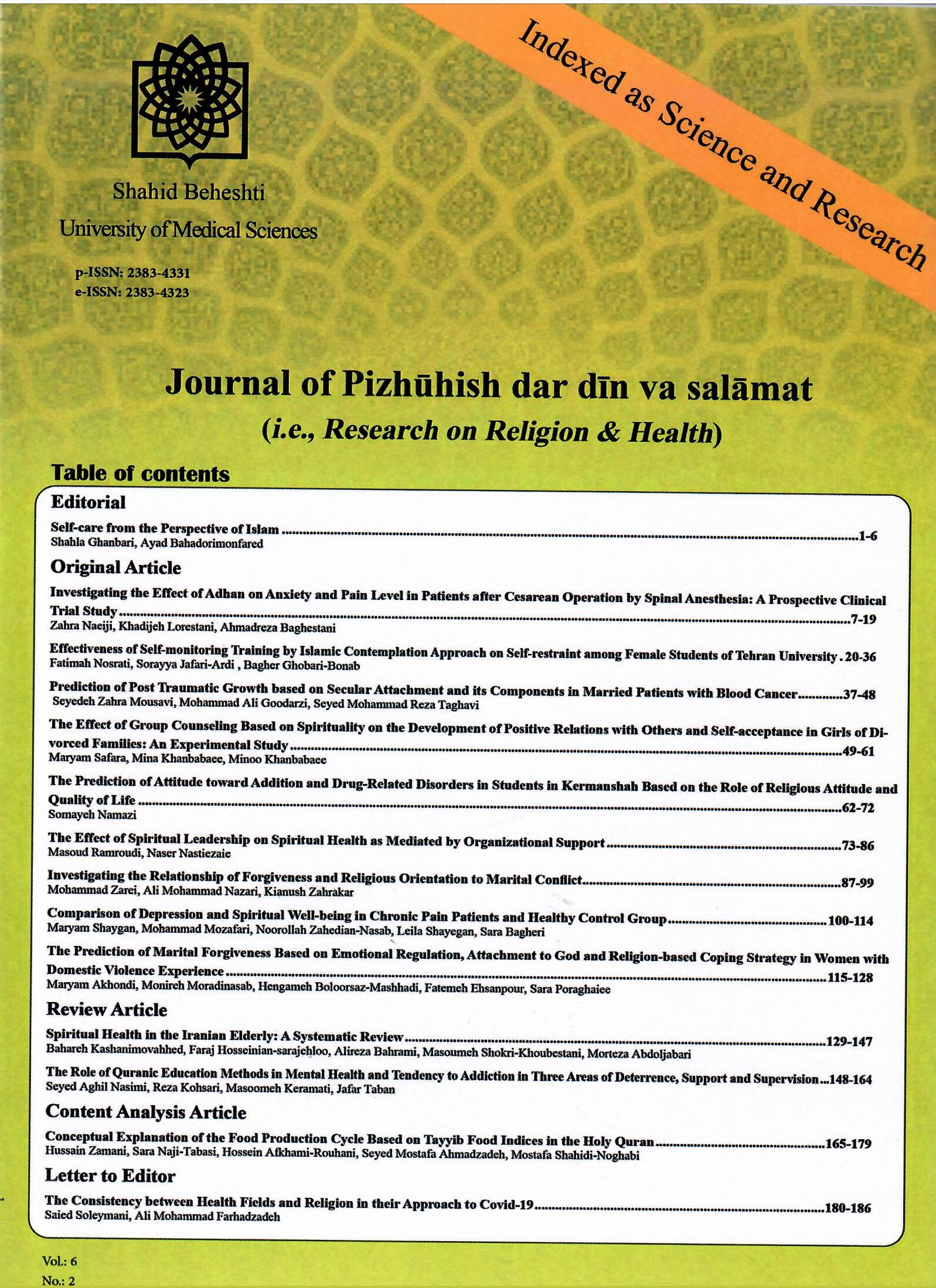Background and Objective: The structure of some families provides conditions for violence against women. Violence threatens the health and security of the family. The purpose of this study was to predict marital forgiveness based on emotional regulation, attachment to God, and religion-based coping strategies in women with experience of family violence.
Methods: This is a descriptive and correlational study. The statistical population included all women referring to counseling and psychotherapy centers in Tehran in 2018. A total of 300 people were selected by simple random sampling. The research instruments included marital forgiveness scale, cognitive-emotional adjustment scale, attachment to God's scale, and religious coping scale. Data were analyzed using descriptive statistics, correlation coefficient and regression analysis. In this study, all the ethical considerations have been observed and no conflict of interest was reported by the authors.
Results: The results of the present study showed that emotional adjustment variables (P<0.05, r=0.61), attachment to God (P<0.05, r=0.48), and religion-based coping strategies (P<0.05, r=0.52) have a significant correlation with marital forgiveness in women experiencing domestic violence and can significantly predict 41.8 percent of the variance in marital forgiveness in these women (P<0.05).
Conclusion: Based on the results, it can be concluded that religion-based coping strategy, safe attachment to God, and adjustment of excitement affect the level of marital forgiveness. Therefore, in the plans developed by the authorities, there is a need to familiarize women experiencing domestic violence with Islamic-spiritual structures and emotional management.
Please cite this article as: Akhondi M, Moradinasab M, Boloorsaz-Mashhadi H, Ehsanpour F, Poraghaiee S. The Prediction of Marital Forgiveness based on Emotional Regulation, Attachment to God and Religion-based Coping Strategy in Women with Domestic Violence Experience. Journal of Pizhūhish dar dīn va salāmat. 2020;6(2):115-128. https://doi.org/10.22037/jrrh.v6i2.22964
Background and Objective: The structure of some families provides conditions for violence against women. Violence threatens the health and security of the family. The purpose of this study was to predict marital forgiveness based on emotional regulation, attachment to God, and religion-based coping strategies in women with experience of family violence.
Methods: This is a descriptive and correlational study. The statistical population included all women referring to counseling and psychotherapy centers in Tehran in 2018. A total of 300 people were selected by simple random sampling. The research instruments included marital forgiveness scale, cognitive-emotional adjustment scale, attachment to God's scale, and religious coping scale. Data were analyzed using descriptive statistics, correlation coefficient and regression analysis. In this study, all the ethical considerations have been observed and no conflict of interest was reported by the authors.
Results: The results of the present study showed that emotional adjustment variables (P<0.05, r=0.61), attachment to God (P<0.05, r=0.48), and religion-based coping strategies (P<0.05, r=0.52) have a significant correlation with marital forgiveness in women experiencing domestic violence and can significantly predict 41.8 percent of the variance in marital forgiveness in these women (P<0.05).
Conclusion: Based on the results, it can be concluded that religion-based coping strategy, safe attachment to God, and adjustment of excitement affect the level of marital forgiveness. Therefore, in the plans developed by the authorities, there is a need to familiarize women experiencing domestic violence with Islamic-spiritual structures and emotional management.
Please cite this article as: Akhondi M, Moradinasab M, Boloorsaz-Mashhadi H, Ehsanpour F, Poraghaiee S. The Prediction of Marital Forgiveness based on Emotional Regulation, Attachment to God and Religion-based Coping Strategy in Women with Domestic Violence Experience. Journal of Pizhūhish dar dīn va salāmat. 2020;6(2):115-128. https://doi.org/10.22037/jrrh.v6i2.22964

